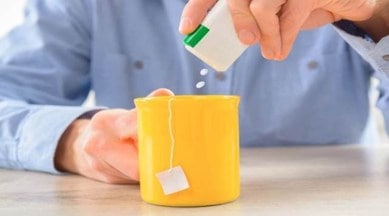
[ad_1]
‘We have assessed the potential carcinogenic effect of aspartame (hazard identification). Following this, the Joint FAO/WHO Expert Committee on Food Additives (JECFA) will update its risk assessment exercise on aspartame, including the reviewing of the acceptable daily intake and dietary exposure assessment for aspartame,’ says WHO

The World Health Organisation (WHO) could categorise one of the vital generally used synthetic sweeteners, aspartame, as probably carcinogenic to people, in response to reviews. This comes simply over a month after the company advisable in opposition to utilizing all non-sugar sweeteners for controlling weight by non-diabetics.
In an e mail to the Indian Express, the WHO stated that its International Agency for Research on Cancer has assessed the potential carcinogenic results of the unreal sweetener. The Joint FAO/WHO Expert Committee on Food Additives can also be reviewing its suggestions on acceptable day by day consumption and dietary publicity evaluation for aspartame.
“The result of both evaluations will be made available together, on July 14, 2023,” stated WHO in a mail. The inter-government company stated: “IARC has assessed the potential carcinogenic effect of aspartame (hazard identification). Following this, the Joint FAO/WHO Expert Committee on Food Additives (JECFA) will update its risk assessment exercise on aspartame, including the reviewing of the acceptable daily intake and dietary exposure assessment for aspartame.”
You have exhausted your
month-to-month restrict of free tales.
To proceed studying,
merely register or sign up
Continue studying with an Indian Express Premium membership beginning Rs 91 per 30 days.
This premium article is free for now.
Register to learn extra free tales and entry provides from companions.
This content material is unique for our subscribers.
Subscribe to get limitless entry to The Indian Express unique and premium tales.
This content material is unique for our subscribers.
Subscribe now to get limitless entry to The Indian Express unique and premium tales.
What is aspartame?
Aspartame is a synthetic sweetener that’s 200 occasions sweeter than regular sugar. It is offered in energy type for table-top use in tea and occasional. It can also be generally utilized in colas, chewing gums, and packaged desserts. In reality, food plan colas will be zero energy as a result of they use synthetic sweeteners as a substitute of sugar.
Aspartame does include energy. It will be damaged down utterly by the digestive system and therefore doesn’t result in spikes in blood glucose ranges after consumption like regular sugar.
What do medical doctors say?
Dr Anoop Misra, Chairman of Fortis CDOC Hospital for Diabetes and Allied Sciences, says that folks needs to be conscious of what they’re consuming and never assume synthetic sweeteners are risk-free. He particularly warned in opposition to food plan colas that folks eat not figuring out they include a number of synthetic sweeteners, together with aspartame.
“There is evidence linking use of aspartame to higher levels of cancer in the population — the French study demonstrated this. I would consider this to be moderate quality evidence. They have observed the effects in a population and there can always be confounders like people reporting their use of sweeteners. However, the study should have been enough to sound alarms. It should be enough to warn people to be careful of what they are consuming,” stated Dr Misra.
The French examine he referred to was a inhabitants based mostly cohort of 100,000 who have been adopted for a median 7.8 years. It discovered that there was an general enhance in danger for cancers amongst those that used synthetic sweeteners, specifically aspartame and acesulfame-Okay. The examine discovered increased dangers for breast and obesity-related cancers in individuals who consumed the sweeteners.
Dr V Mohan, Chairman of Dr Mohan’s Diabetes Specialities Centre-Chennai, stated: “There have been several discussions since the WHO recommendations came out last month. I do not know whether there has been some new evidence since. But, if you look at the studies quoted by the previous WHO report, they themselves said all the evidence they have quoted were of low to very low certainty. We do not have very good evidence to show that it leads to adverse effects in humans, let alone cancers and mortality.”
He stated: “The problem is the calories that people end up consuming. If you have a dessert with artificial sweetener, the calories that come from sugar are not there but the calories that come from ghee, maida and everything else are still there.”
Dr Mohan stated that consuming one or two-odd tablets of aspartame in tea or espresso, which is what he recommends to his diabetic sufferers, resulting in most cancers is a protracted stretch because the dose is 1,000 occasions decrease than the day by day allowed dosage.
“Having said this, there is never any smoke without fire. We need long term, good quality studies to understand the impacts of artificial sweeteners,” he cautioned.
What did WHO beforehand say?
The WHO in May advisable in opposition to the usage of all synthetic sweeteners to realize weight reduction or forestall life-style ailments corresponding to diabetes. The advice didn’t apply to diabetics, the inter-government company clearly stated. “WHO suggests that non-sugar sweeteners (NSS) not be used as a means of achieving weight control or reducing the risk of non-communicable diseases,” was the spotlight of a 90-page report based mostly on almost 283 research.
The evaluation stated that there might be some weight reduction and discount in physique mass index within the brief time period because the sweeteners convey down the energy consumed by means of sugar, however in the long term they have been related to weight achieve and elevated danger of diabetes, cardiovascular ailments, and mortality.
First printed on: 29-06-2023 at 19:54 IST
[adinserter block=”4″]
[ad_2]
Source link